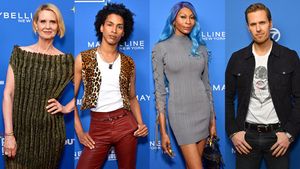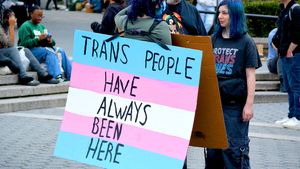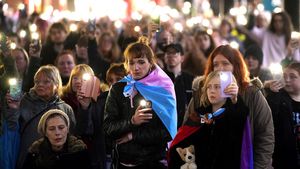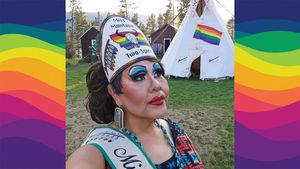I like a good boycott. Chick-fil-A's CEO is an unabashed antigay donor? Fine, I don't need his deep-fried, sodium-chicken anyway. We even un-registered from Target for my 2010 wedding and switched to Bed Bath & Beyond because the CEO had donated to an antigay organization. The spouse and I are gangster like that. Quite frankly, I can thoroughly live the rest of my life without Russian vodka. I'm more of a craft beer or tiny winery type of gal, anyway. If I do need a Bloody Mary, there's always Tito's, or Skyy, so this dumping-Russian-vodka-into-the-gutter thing doesn't really put the kibosh on my Friday nights, but I guess I'll participate in solidarity?
Most people, however, will participate in solidarity, and that will be the end of it. They'll feel content with their choice. Sorry to break it to them, but doing that simply provides a false sense of accomplishment. Other passive forms of activism like sharing goofy memes mocking Vladimir Putin and "liking" Facebook pages titled, Russia Can Suck It Because I'm Gayer Than A Peacock might help them feel like they're doing something. That's a great first step. I value our freedom of expression, and I think Dan Savage's call to boycott has been effective simply because it got people to notice what's been happening. What it won't do, however, is stop Russia from jailing and deporting LGBT travelers. Their government will continue to allow vigilantes to publicly humiliate and assault LGBT people. So before we get all high-and-mighty about our vodka sodas, remember that this is Russia for goodness sakes. These people know a thing or two about "doing without;" our decision to skip a spirit made in Moscow is not really going to feel like a political dropkick to the sternum.
The benefit of all the politicking around vodka is that it's at least raising the profile of Russia's antigay policies. The disadvantage, however, is that we're being distracted from trying to change what's really happening: LGBT athletes and spectators are expected to come to the Olympics in Sochi about six months from now. Just by coming to Russia, if they were to talk to the press about being gay, hold hands with their partner, or publicly display their gayness, they risk being jailed for 15 days and then deported.
Would you want to sit in a Russian jail in the middle of February? Yeah, didn't think so. But perhaps this is what needs to happen.
I've been chipping away at an article for the past few weeks about Russia, and whether athletes will be protected if they qualify for the Olympic team (or the World Track & Field championships this summer, the 2018 FIFA World Cup, or the 2017 Bobsleigh Championships, all slated for cities in Russia). In all of this reporting, I was particularly struck by a belief held by the International Olympic Committee: Sport is a human right for all individuals.
Coincidentally, the right to not be assaulted or jailed because of your sexual orientation, gender identity, or sex is also a human right. A pretty big one, I'd say. And Sochi is where both of these human rights are primed to collide.
In the olympic tradition, the games are supposed to be a period of peace and political neutrality, outside of bobsled competitions, of course. But while the Olympics only occur every two years between the winter and summer games, geopolitical conflicts and relations are constant.
When I think about this conflict with Russia and the Olympics, I think of Sarah Attar and Wojdan Ali Seraj Abdulrahim Shahrkhani, the first women to represent Saudi Arabia at the Olympics, when they competed in the London 2012 games, despite their country's oppressive history when it comes to women. I think about this famous shot with John Carlos, Tommie Smith, and Australian Peter Norman (who wore a patch on his jacket in solidarity with his African-American fellow Olympians).
They raised their fists to remind others that these black men could represent their country at the biggest sporting event in the world, but were still discriminated against at home. These people took stands for their identities, and faced the social consequences.
This time around, gay speed skater Blake Skjellerup says he's aiming for a spot on Team New Zealand. American figure skater (and lover of all-things-Russian, including his husband) Johnny Weir also plans to return to the olympic ice in February. I commend both of them, and say we need even more athletes to come out — not just because I'd get to write about them, but to hold President Putin and the Russian Duma's feet to the fire. Can Russia really arrest gay athletes with the entire world literally watching? Go ahead, Russia, just try to lay a finger on our athletes. We're Americans; we revel in the weepy, horn-backed, sob stories of poor athletes who've trained each day since fetushood, and the mom who woke up at 5 a.m. to drive their kid to practice every morning uphill in the snow both ways, just for a single Olympic moment. You don't mess with our athletes. We will be up Russia's ass faster than Bob Costas can flip his bangs.
While the U.S. Olympic Committee did not comment on my article, its members are reportedly working behind the scenes with the State Department to protect LGBT athletes while they compete in Russia. But every sporting committee in the world that plans to have an event in Russia needs to be doing the same thing, or demanding that the government drop this archaic law or lose the millions of dollars that would be spent there. Every foreign minister in any country that claims to care about its LGBT citizens should be both concerned, and ready to raise some hell toward the Kremlin. Or, as my pal Cyd Zeigler from Outsports believes, maybe Russia shouldn't even be allowed to compete at all.
Do we truly want to cripple Russia's economy? Vodka may be the most enticing, symbolic item to boycott, but Russia's biggest exports are oil, and raw materials like aluminum, coal, and iron. Why aren't we demanding that American companies stop accepting materials from Russia? And why aren't we dumping beverages like Coca-Cola, an Olympic sponsor that reportedly has 16 plants across the Russia Federation and employes 13,000 people? I love an ice cold Coke as much as anyone, but hey, I didn't say this was going to be easy, people!
If you can get to Sochi this February, I think we need to provide support to Russian activists like Konstanin Iablotckii who is planning protests and demonstrations during the games. And if he and his comrades get arrested for doing so, we need to raise hell until they're out of police custody. Can't fly to Russia? Perhaps their embassy in D.C., or your local Russian consulate might be a good place to raise some rainbow flags and have a kiss-in.
We can urge NBC, which will provide the main Olympic coverage for the U.S., to beat the drum on this issue, just as The Advocate will continue to do. And athletes who are our allies should do just as Australian sprinter Peter Norman did by wearing a pin, or a patch on the podium. They can speak out on behalf of the LGBT athletes who fear doing so.
So do I completely agree with this Russian vodka boycott? No, not really, but I think it's great that we feel an urge to do something. It's keeping the conversation alive, even if that conversation is over gin martinis instead of vodka ones.
MICHELLE GARCIA is The Advocate's commentary editor. Tweets welcome @GarciaReporting.
Like SheWired on Facebook
Follow SheWired on Twitter


























































































































